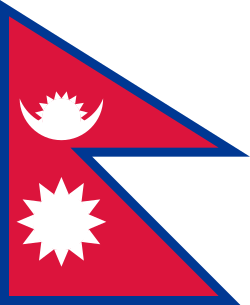| Nepal at the 1984 South Asian Games | |
|---|---|
 | |
| IOC code | NEP |
| NOC | Nepal Olympic Committee |
| Website | https://www.nocnepal.org.np/ |
| in Kathmandu, Nepal 17 to 23 September 1984 | |
| Competitors | 105 in 5 sports |
| Medals Ranked 4th |
|
| South Asian Games appearances (overview) | |
Nepal participated in the first edition of SAG, 1984 South Asian Games at Dasarath Stadium, Kathmandu, Nepal from 17 to 23 September 1984. A total of 105 competitors representing Nepal, participated in the games. Nepal was the host of the first South Asian Games. It finished fourth at the medal tally with a total medals count of 24 including 4 golds, 12 silvers and 8 bronzes. [1] [2]